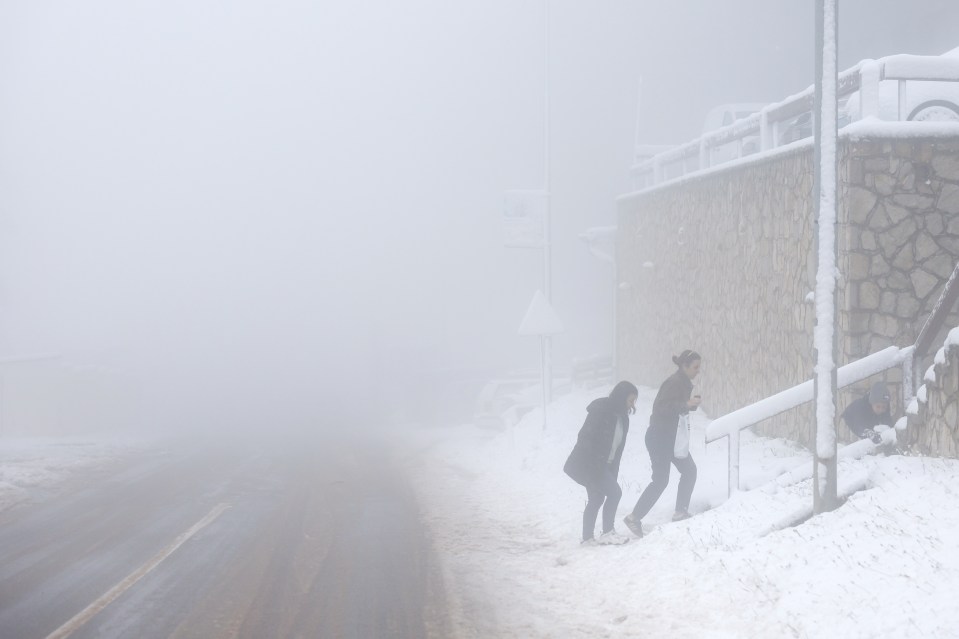A SNOWSTORM has left thousands without power as another burst of wild weather hits Europe.
Heavy flurries of ice and snow have wreaked havoc across the mountainous regions in the Balkans – downing trees and power lines.
APPeople walk on a road road during an unexpected snowfall on mountain near Sarajevo, Bosnia[/caption]
APA car drives along a road during the surprise heavy snow in Bosnia[/caption]
EPATourists have been left stunned by the freezing temperatures.[/caption]
APAuthorities have encouraged drivers to make the switch to winter tyres – a month before they become on November 1.[/caption]
Tourists visiting the Bosnian capital of Sarajevo have been left astonished by the freezing temperatures.
One visitor, Sandra Majstorovic, told The Independent: “We came here in flip-flops and now we need boots and jackets.”
The freak weather incident has comes at the end of a week characterised by floods and large torrents of rain across a range of European holiday hotspots.
In Greece, cars have been left underwater, with main roads being transformed into rivers.
Meanwhile, in Ibiza, staggering aerial videos have also revealed the full devastation of brutal floods that swamped the island after a biblical downpour.
The extreme elements being seen in the Balkans have also been circulating across social media, with videos capturing the stunning, artic-like landscape.
More than half a metre of snow has already fallen across the mountainous terrain with meteorologist Slobodan Sovilj, from the state Hydrometeorological Service, suggesting the snowfall could reach record levels for October.
Drivers in Bosnia have been warned to be extra careful, with authorities encouraging them to make the switch to winter tyres a month before they become obligatory.
Meanwhile, in Serbia, several municipalities declared a state of emergency to deal with the ongoing snowstorm.
While citizens of the Balkans may be used to colder conditions, this premature glimpse of winter marks a stark contrast to the scorching weather they would have experienced just a few weeks ago.
In September, the region reached temperatures of up to 30 degrees Celsius, ten degrees shy of the 40 mark which became the norm during the summer’s heat waves.
Unsurprisingly, this quick climate shift has caught a number of these areas off guard.
Villages across Serbia and Bosnia have suffered power outages as a result of wet snow, while many roads and mountain passes have also been closed to the public.
Furthermore, the national railway company reported significant train delays and cancellations, due to the damaged caused to overhead power lines.
However, residents across the Balkans are not alone in their weather troubles.
Earlier this week, extreme rainfall swept across the coast of southeastern Bulgaria, sparking floods which have left at least three people dead.
Towns have been overwhelmed by filthy torrents of water as the horror weather grips the countryside.
The floods have swept away cars and caravans into the sea whilst also overcoming houses, hotels and campsites.
On Friday, authorities said that hundreds of people were forced to evacuate their homes.
Public transport has also ground to a halt due to the extreme weather, with both the army and navy deploying rescue teams to assist those in the flooded areas.
Experts say that these extreme conditions could be linked to climate change.
APA car drives along a road during an unexpected snowfall on mountain Jahorina near Sarajevo, Bosnia, Thursday, Oct. 2, 2025. (AP Photo/Armin Durgut)[/caption]
APThousands of residents have been left without power due to the freak weather incident.[/caption]
APThe recent climate shift marks a stark contrast to the scorching temperatures of just a few weeks ago.[/caption]
EPASeveral Serbian municipalities have passed emergency measures to deal with the ongoing snowstorm.[/caption]

